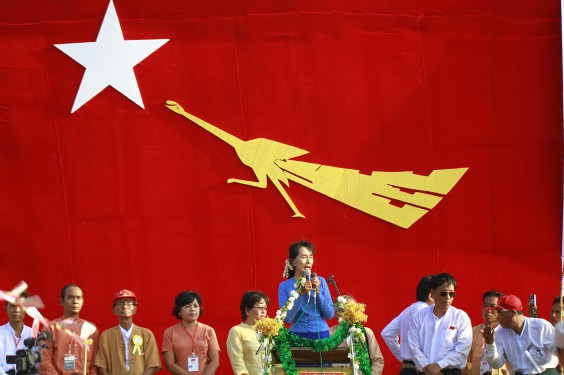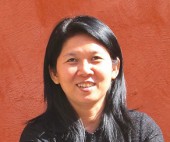Will There Be a Six-Party Dialogue Before the Burmese Election?
by Ma Thida / September 23, 2015 / No comments

Aung San Suu Kyi gives a speech during the 2012 by-elections. She first called for a roundtable meeting with the president and other political leaders in 2013. Photo via Wikimedia Commons.
Calls for a dialogue between Burma’s political leaders seem to have been abandoned in the lead-up to November elections, but the need remains urgent.
Since he took office in 2011, President Thein Sein has heavily emphasized a “new political culture” in Burma. The phrase refers to solving political problems through “dialogue” rather than arbitrary arrest or violent conflict. Indeed, democratic leader Aung San Suu Kyi has asked for “dialogue” with top military leaders since she was released from one of her house arrests in 1995. At the time, Aung San Suu Kyi’s National League for Democracy (NLD) party wanted the military junta to acknowledge NLD’s legitimate win in the 1990 election. However, the military continually rejected these calls for dialogue, and eventually enacted the 2008 constitution. In 2010, a sham election was held under this constitution. The NLD boycotted, leading to a landslide victory for the military-backed Union Solidarity and Development Party (USDP) and, in 2011, the formation of government dominated by former military officers. This new government did start engaging in dialogue, but not with the NLD or Aung San Suu Kyi. Instead, it spoke mainly with ethnic armed groups through its Union Peace Working Committee (UPWC). This is the history President Thein Sein is alluding to when he mentions “dialogue” as a part of his government’s new political culture.

- Literature is an echoing voice of people’s thought. Along with its people, Burma’s literature and media have suffered greatly during five decades of censorship. The majority of Burma’s population are voiceless, and many untold stories are yet to be discovered by local or international writers and journalists. Here, let’s try to find out and listen to what problems people are feeling, thinking, and facing regarding freedom of expression in their everyday lives in Burma.

- Ma Thida is a Burmese human rights activist, writer, medical doctor, and former prisoner of consciousness. In 1993, she was sentenced to twenty years in Burma’s Insein Prison for actively supporting the Nobel laureate Aung San Suu Kyi. She served six years of her sentence, largely in solitary confinement, and was released through the efforts of Amnesty International and PEN International. She has published nine books in Burmese and English, including The Sunflower (1999), The Roadmap (2011), and Sanchaung, Insein, Harvard (2012), a memoir. Ma Thida is currently president of PEN Myanmar.
The NLD decided to take part in the April 2012 by-elections, and won almost all the open seats. Despite this, its presence in the government, both in national and regional legislatures, is no more than four percent. Additionally, the arrests of journalists and students is evidence that the current government lacks good intentions for genuine reform and the capacity for a peaceful transition from military rule to a civilian democracy. Therefore, some political parties and activists are concerned that there is no mechanism to reduce the military dominant political culture in either the executive or the legislative bodies, and no motivation to strengthen the practice of rule of law. In late 2013, Aung San Suu Kyi demanded an official meeting to dialogue with four key political players — including the president, the speaker of general assembly, and commander-in-chief — to discuss constitutional reform. Aung San Suu Kyi wants to be a presidential candidate, but her late husband was an Englishman and her two sons are British; the current constitution bans candidates with foreign spouses or children. President Thein Sein did not meet with Aung San Suu Kyi in 2013 and instead convened a 14-party meeting in October of 2014 and a 48-party meeting the following January.
Aung San Suu Kyi criticized both meetings because the principle behind their orchestration was “not clear.” In November 2014 the parliament proposed a six-party meeting. This time, the NLD accepted. The meeting between the president, the speakers of both the upper and the lower houses, the commander-in-chief, a representative from the ethnic political parties and Aung San Suu Kyi was held on April 10, 2015. This was only one time a six-party meeting was held. President Thein Sein has emphasized the importance of signing a nationwide ceasefire with ethnic armed groups as first step of peace process. But the NLD rejected this procedure and said, ‘Talks on the peace process and national reconciliation should proceed at the same time. National reconciliation talks, like the six-party talks, should not be postponed with the excuse of the peace process.”
The aim and essence of a “dialogue among high-level political leaders” has never been very clear. Once, the president’s spokesperson told the media that these meetings are not for finding concrete solution to country’s problems but to brainstorm ideas for further discussion. Even when people were fed-up with the argument over how many parties should be in this high-level dialogue, very few in the media questioned the true purpose and agenda of these meetings. In any case, it was believed the aim of this meeting was to discuss constitutional reform, a peace agreement, and the upcoming national elections, and it was a popular topic in the media until a new constitutional amendment was proposed by a USDP minister on June 9, 2015. The proposal would have changed the requirements for running for the office of president or vice president and lowered the threshold for achieving constitutional reform.
The amendments were voted down by the military-run parliament, an outcome that practically terminates the process of amending the constitution, based on a report from the 31 lawmakers who make up the Parliamentary Constitutional Amendment Implementation Committee. Many articles published in state-owned newspapers seriously criticized the draft of new amendment act and accused it of favoring the parliamentary administration. Finally, the constitutional amendment created a large faction in the USDP and greater concern in the army over Shwe Man’s political ambitions. The military already believed that Shwe Man could manipulate the USDP to his personal benefit and take advantage of his relationship with Aung San Suu Kyi to obtain even greater power. All of this led up to early August’s soft coup in the USDP.
Since then, all political parties became busier than ever in early September as they prepared for November’s general election. People are preoccupied with an unbelievably inaccurate voters list. Meanwhile, nine foreign embassies in Burma have made a joint statement expressing their concern that religion is being used as a tool of division and conflict during the campaign season. This shows the fragility of our electoral process. In early October, there will be a signing of a nationwide ceasefire agreement with two armed ethnic groups. The media, also preoccupied with these new issues, is not calling for another six-party dialogue. Among its three major aims, only constitutional reform is now out of question; the peace process is, of course, ongoing, and they still need to discuss how the upcoming elections will unfold with the interest of national reconciliation.
However, it seems like none of the participants in the six-party dialogue are likely to call for it again, much less be willing to face one another. Even Aung San Suu Kyi and the NLD have abandoned the call for a dialogue, and instead are urging people to vote for their parties since it is time for Burma to change. A lot of people are concerned with direct and indirect threats from ultranationalist activists and anti-NLD campaigns. Once, people were less worried about national reconciliation because of armed resistance. Now, people are amazed to learn that none of the six parties have called to restart dialogues or ensure the upcoming election unfolds peacefully. Instead, they are preparing for a post-election period based on a mission of achieving national reconciliation.
Free and open elections are, of course, important for a democratic system to function. However, winning an election without a consensus as to how to keep the elections truly free and open, and make the transition from one high-power political player to another fruitful and peaceful, might not lead to sustainable peace and national reconciliation. We now seriously need to hear a dialogue. Please, keep the democratic principle of a successful transition to democracy in Burma. Please, have another dialogue before the election.




